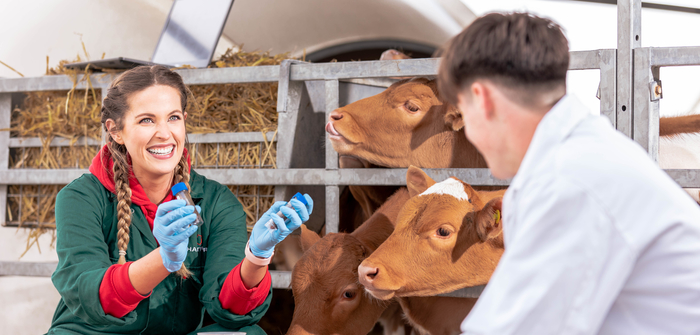New groundbreaking research is under way at Hartpury University to enhance the health, welfare and milk production of dairy herds and inform best practice in the agriculture industry.
In the first study of its kind, Aisling Carroll, Lecturer in Animal Science at Hartpury University, will examine gut microbiomes from dairy calves over a four-year period to assess the impact of routine farm management on their long-term health, welfare, development and milk production.
The project will assess if the use of a probiotic from birth to post-weaning in dairy calves can support and/or safeguard against stress-related microbiome variations during key management events.
It will also examine whether the analysis of faecal bacterial communities in dairy calves can be used as an objective indicator of health, welfare and production state in lactating heifers.
The findings will provide guidance to dairy farmers and stakeholder groups on best practice and possibly support schemes such as the Red Tractor Assurance, which actively promotes food safety, animal welfare and hygiene.
Cow mortality rates and key performance indicators have been explored by governing bodies as markers for farm welfare surveillance and indicators of overall health status.
Stress and other factors, such as diet and the environment, are known to affect the structure of gut microbiomes, which can subsequently have an adverse effect on a calf’s overall health.
The research will benefit from access to Hartpury’s commercial farm, Home Farm, which includes 250 dairy youngstock, 200 Holstein milking cows and 50 Guernsey cattle, as well as smart farming technologies in Hartpury’s Agri-Tech Centre.
Ms Carroll said: “High standards of neonatal calf management are vital for health, welfare, and productivity.
“Reducing dairy calf mortality and supporting the improvement of calf health and welfare would be a notable positive contribution to the sector, but research informing strategic management intervention to support this is currently lacking.
“This research will examine the impact of management events, such as grouping, housing, disbudding and weaning on faecal bacterial communities of dairy calves to understand the concurrent impact on development and health.
“GIT microbiome development and influence of management events will be compared against health, welfare and production parameters of heifers that progress into dairy production.
“Assessing bacterial community structures is important in order to establish the biological effects of management events on dairy calves and to identify potential modulation points in the microbiota to improve health, welfare and production.
“These points can act as an innovative tool, supporting continuous calf monitoring on farms to reduce morbidity and mortality, directing strategic management intervention.”
Ms Carroll is carrying out the research for a PhD with support from her academic colleagues at Hartpury University as well as the University of the West of England and Harper Adams University.
The findings will be communicated to industry bodies via the Agri-Tech Centre at Hartpury and research partners.


